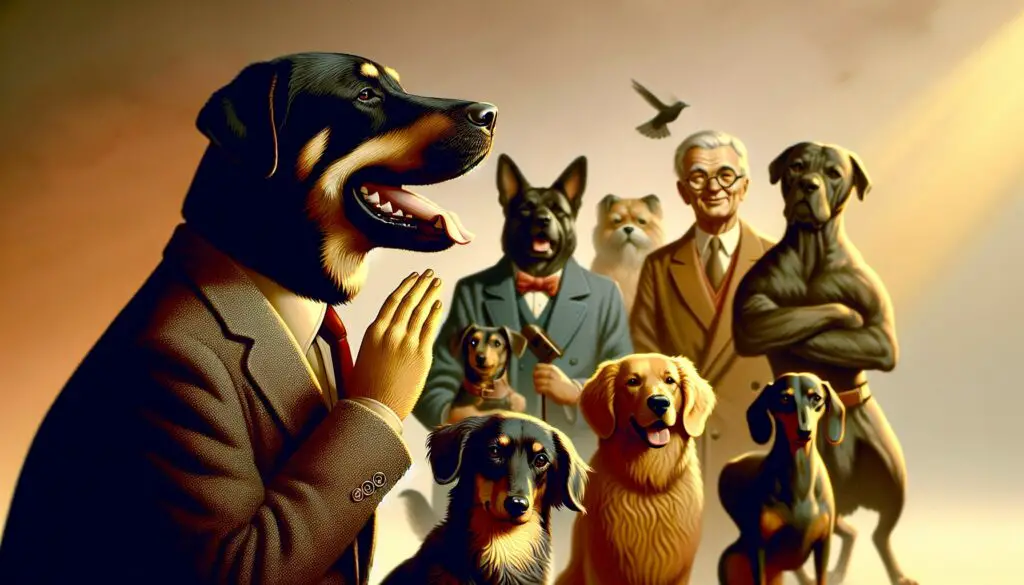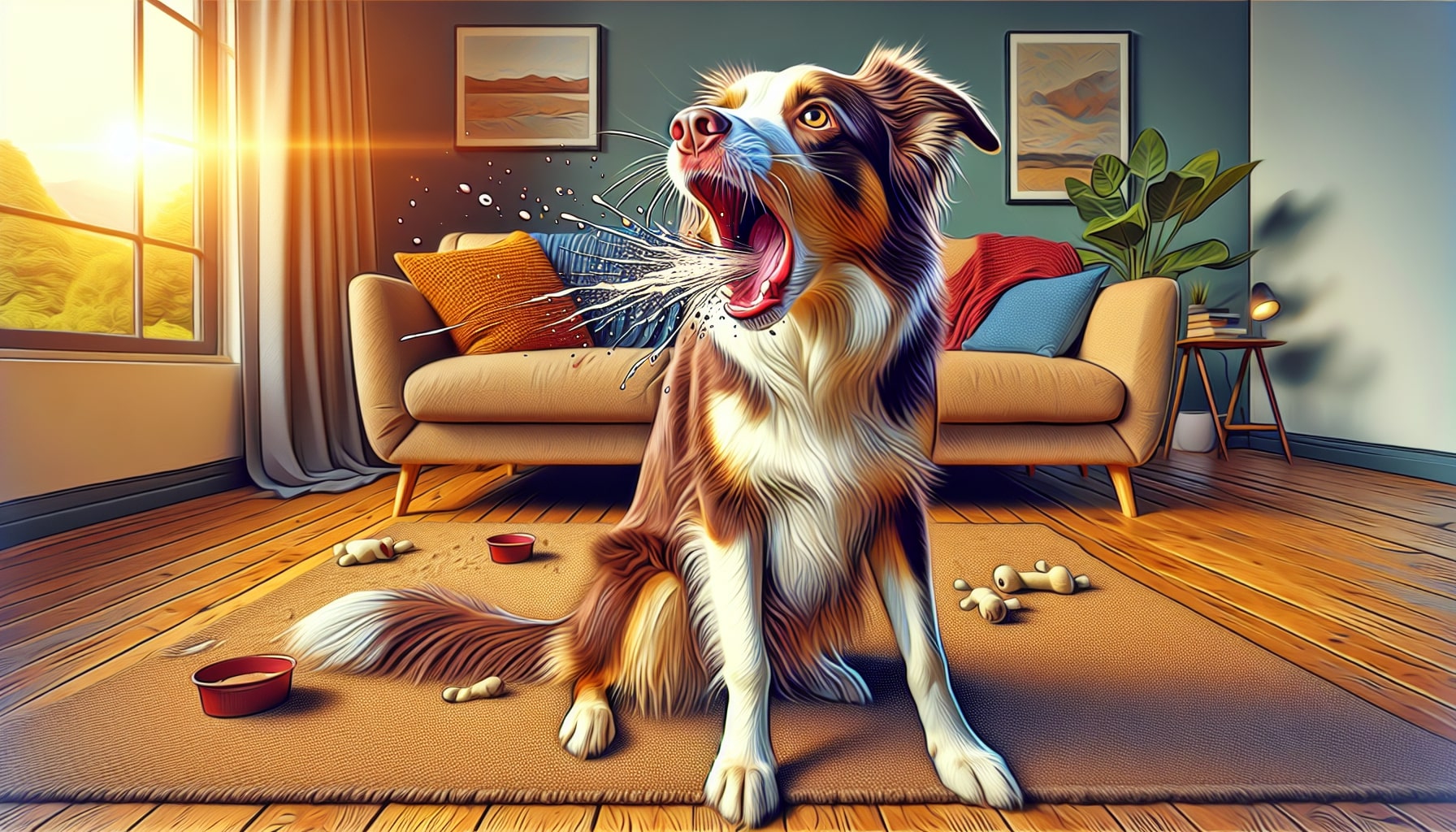As a dog mom, I’ve seen it all, from tail wagging to ear scratching, and everything in between. But one scenario that always raises a worrisome eyebrow is when my furry babies seem to be trying to clear their throats. So, I decided to dig in, chatting with veterinarians and other pet owners, poring over medical texts, treating my pups more like humans than ever before.
“Cough, hack, gag” – it’s a concert no dog parent enjoys. However, just like humans, our canine pals could potentially have something caught in their throats, or an underlie that’s causing them discomfort. In some cases, it sounds like the dog is trying just to clear his throat; in more severe ones, it’s more of a hacking cough. Dogs Clearing the Throat: Common Concerns When a pet starts to sound like they’re constantly trying to clear their throat, it can indeed be a distress call for help. These hostile throat acoustics can range from hacking sounds to a dry cough reminiscent of a cat trying to cough up a hairball, or the harsh Kennel Cough, distinctive for their honking noise – not the most melodious symphony your pup can play!
Do you want to know more about reasons why dog is trying to clear throat? Then use the table of contents below to jump to the most relevant section. And you can always go back by clicking on the black arrow in the right bottom corner of the page. Also, please note that some of the links in this article may be affiliate links. For more details, check the Disclosure section at the bottom of the page.
Here's what we'll cover:
Signs of Throat Discomfort
Do their eyes plead for help while they hack and gag? Has your pet been trying to clear his throat more often, especially after meals or during walks? Does your canine buddy sneeze or lose his appetite? These could all indicate throat discomfort and underline the importance of an immediate veterinarian visit for a precise diagnosis.
Possible Causes of Coughing and Throat Clearing
What could be the cause of this uncomfortable situation? For one, there could be something lodged in his throat. Alternatively, a disease like Kennel Cough, a common cause of coughing in dogs, could be the culprit. An obstruction in the airway can also lead to a frequent “clearing of the throat.” It’s also worth noting that, in older dogs, the collapse of parts of the airway can transition from a light “clearing throat” sound to a persistent cough. But fret not! As alarming as it sounds, with the right diagnosis and treatment from your vet, your beloved dog might soon be off the hack-list and back to their happy, healthy selves. This was just a quick look into reasons why your dog might be throat-clearing and coughing. Stay tuned for more information about canine health and behavior – knowledge is our best friend in ensuring their well-being!
When to Take Your Dog to the Vet?
I know, I know, you’ve heard it before, but I can’t stress it enough. When it comes to conditions like pneumonia, respiratory disease, and what sounds like the dog version of a cold, it’s always essential to consult a vet. Trust me, if it sounds like your dog is trying to clear the throat and coughs persistently, it’s time to schedule a visit.
Dogs can be caused significant harm by ignoring these common symptoms. Here’s the kicker, a physical exam, x-ray or other diagnostic tests can help determine the underlying cause. And yes, I did say x-ray, but don’t panic, it’s not as scary as it sounds!
How to Help Your Dog if It’s Like Something Is Stuck in His Throat?
If you’re like me (and I bet you are), you’ll do anything to ensure your pup is feeling tip-top. Now, if it seems like your dog has something lodged in their throat, it might be they’ve snaffled up some sneaky leftovers when you weren’t looking! We’re talking anything from a dog’s favorite chew toys to unguarded Halloween candy.
Yes, pups these days can find some hilariously unusual things to lodge in their throats. Firstly, try not to panic; consult a vet if you’re unsure. Sometimes a simple examination can determine whether there’s a foreign object causing coughing or it’s an infection.
Preventive Measures and Care
Raising my fur family, I’ve learned that an ounce of prevention is worth a pound of cure (or in this case, a boatload of cuddles). Preventing respiratory infections isn’t just about avoiding the dreaded kennel cough or conditions like canine pneumonia. It’s about overall health – mysterious lethargy, persistent cough, and the “bleh” mood can all be signs of a respiratory tract issue.
Ensuring Proper Hygiene and Care in Kennels
Ah, kennels. Now, there’s a topic! Any well-meaning dog owner will tell you: hounds love socializing as much as we do! While doggy daycare and kennels are lifesavers, these venues, unfortunately, have the potential to spread infections – the dreaded kennel cough fitted right in here, like a breed of cough usually rampant among social pups. Ensuring proper hygiene and health care in kennels could be a difference between a happy bark and a cough.
Preventing and Managing Respiratory Infections
Look, we all get the sniffles sometimes, even our furry friends. A common symptom among dogs suffering from respiratory disease is mucus discharge – I know, yuck! But don’t freak out. Pneumonia and other respiratory diseases may sound scary, but with your vet’s guidance, they can be managed and even prevented.
Constant conversations with your vet can help determine the root cause and devise an appropriate treatment plan to ensure your pup can bounce back to full health. We do everything we can to stop coughing in its tracks because nobody likes the sound of a hacking hound! Remember, every dog’s cough, just like every human’s, is different. Not all coughs are made equal – but the love for our pups surely is. Stay pawsitive and keep their tails wagging!’
Reducing the Risk of Hairball Formation
‘ Ah, hairballs. One of the most common, yet misunderstood issues face by our furbabies. Now, while it’s more common to see your feline counterparts coughing these up, dogs aren’t immune from the nuisance that is hairball formation. So, how can we as dog moms and dads help reduce the risk? Regular grooming is your number one line of defense; keeping their coats sleek and shiny doesn’t just generate Instagram likes, it also reduces the chances of them swallowing excess fur.
A dog trying to clear its throat might just be struggling to cope with an unruly hairball. Another tip? Feed them a high fiber diet. Just like in humans, a diet rich in fiber can promote good digestion, and help those nasty hairballs pass more easily. Still, it’s not a cure-all solution. If your pup shows signs of discomfort, such as loss of appetite or vomiting, it’s best to consult with a vet for a proper diagnosis.

Maintaining Regular Veterinary Check-ups
Regular vet check-ups are like the coffee of the dog world. Necessary, and oh-so-vital. You see, what we pet owners often forget is that our pooches can’t tell us when they’re experiencing an irritation or an inflammation. Regular veterinary check-ups allow health issues to be identified early. A persistent cough, for example, could be a sign of viral or bacterial infection.
Characterizing it early might just be what you need to avoid dreadful cases of respiratory diseases, like chronic bronchitis. Vets will often check for tell-tale signs, such as a runny nose, weakness, or a decreased appetite. Remember, early detection of these underlying conditions can increase the chance of successful treatment, often with the help of medication like antibiotics. But here’s a quick disclaimer, never play vet with over-the-counter drugs. The incorrect dosage can lead to adverse reactions.
Addressing the Needs of Senior Dogs
Let’s paint a picture, shall we? Your once energetic puppy is now a distinguished older dog. And just like us, as they age, they become more susceptible to health issues. And when I say “senior dogs”, I’m not referring to a very specific age group. It varies from breed to breed—some hitting their golden years as early as six, and others at fifteen.
One of the biggest concerns with older dogs is food intolerance. If they’re showing signs of gagging or attempting to clear their throat after feeding, it might be that they’re struggling to swallow. This usually hints at an underlying condition that could cause inflammation in the throat. Another tell-tale hint of discomfort? A sudden loss of appetite. We all want our dogs to maintain a healthy diet, but when they display a loss of interest in their favorite dinner, it’s a cause for concern.
Decreased appetite, accompanied by coughing, could indicate a chronic condition – and should not go untreated. As pet owners, the best we can do for our senior dogs is provide them seeking proper veterinary advice and have them undergo comprehensive regular check-ups. Prevention, as they always say, is better than cure. And remember, the kindness we extend to our lovely dogs comes back to us a hundredfold, in the form of precious, sweet puppy love.
Thanks for the blog graphics: Canva.com
Doghint.com is a participant of several affiliate programs. The list includes (but not limited to) the following: VigLink, Refersion, ShareASale, and Amazon Services LLC Associates Program, an affiliate advertising program designed to provide a mean for us to earn fees by linking to Amazon.com and affiliated sites. Doghint.com does not intend to provide veterinary advice. All published articles are meant for informational purposes only and not substitute the professional veterinary consultation.


